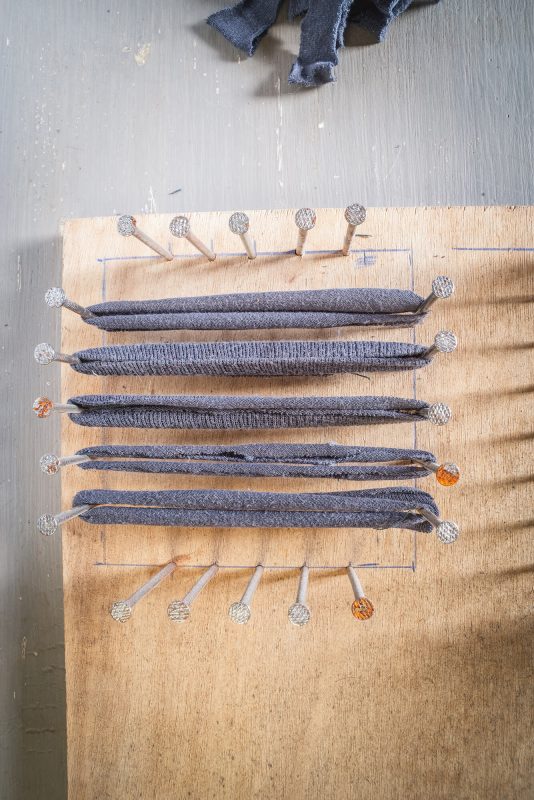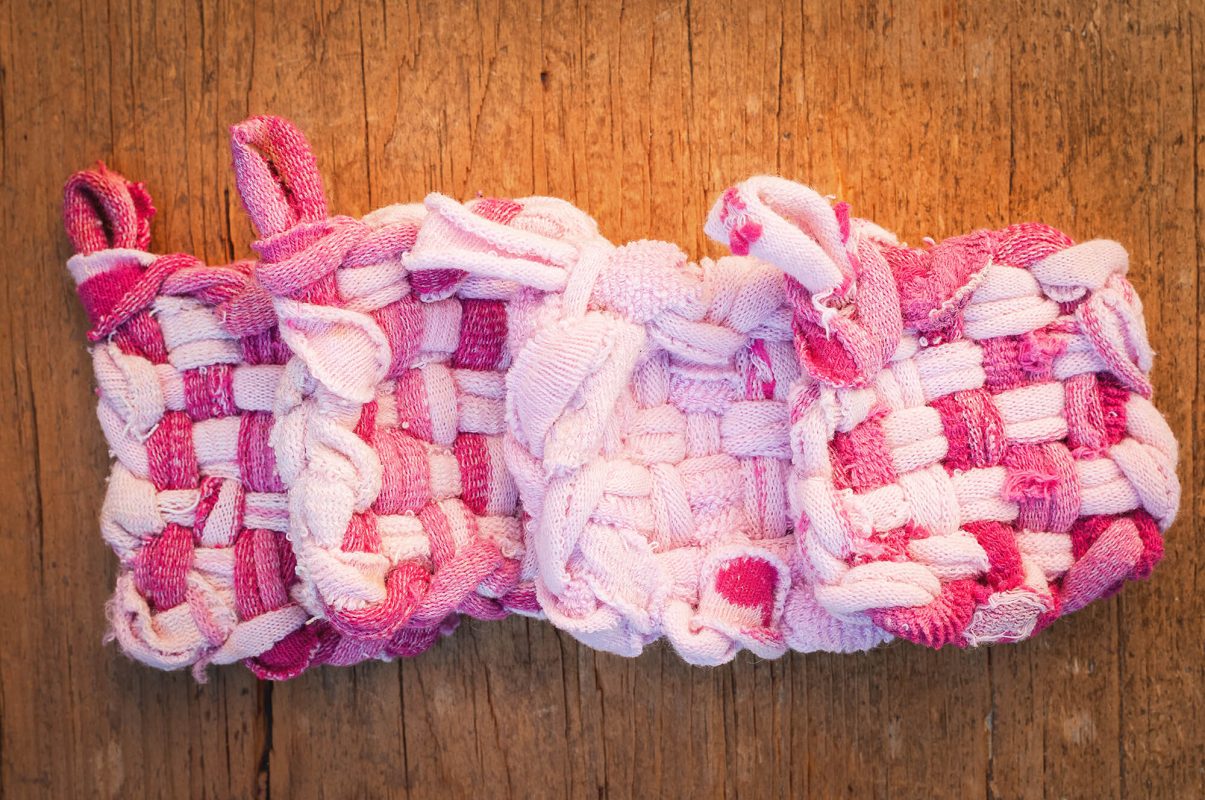In today’s article, we will explain how to create a homemade kitchen sponge by using recycled materials. In particular, we will teach you how to make a Tawashi sponge inspired by Japanese tradition.
This activity can be beneficial and educational for your children, and it’s the perfect opportunity to talk about reuse and waste reduction.
However, before we begin, let’s try to understand what a Tawashi sponge is!
What is a Tawashi sponge?
« Tawashi » refers to a particular type of sponge popular in Japan that was once made from hemp palm. This sponge is ideal for washing dishes, glasses, and other tableware. However, there are also Tawashi sponges made from metal, which are ideal for removing rust and burns from pots and pans. Today, the term “Tawashi” in Japan refers to various sponges, ranging from traditional ones to more modern ones made of synthetic materials.
Despite the many types available, to reduce waste and help the environment, we will focus on homemade Tawashi sponges made with recycled materials,
How to make a homemade Tawashi sponge
The beauty of homemade sponges is that you don’t have to go to the supermarket or the store down the street to get them. It is more fun and better for the environment to rummage through drawers in search of old clothing, such as socks (mismatched, usually), T-shirts, leggings, and old tights!
The search for these materials can also be a fun activity for children. It also teaches them that even if an object is no longer able to perform the function for which it was designed, it can always become useful by turning it into something else. This is the idea behind the concept of zero-waste and reuse.
But what does it take to make a “zero-waste” Tawashi sponge?
To make a homemade kitchen Tawashi, you will need the following crafting tools.
First, to make the loom, you will need:
- A small wood block (with a base of about 20 cm and a thickness of 8-10 cm).
- Twenty nails, wide and flat-headed..
- A hammer.
- A pencil.
- A ruler.
To make the Tawashi, you will need:
- A pair of scissors.
- An old garment from those mentioned above (socks, tights, leggings). Clean, of course! To start: use two or three old socks, then you can experiment with more!
Building a “waste-zero” sponge: a creative activity for kids
Once you’ve gathered everything you need, you’re ready to make your own homemade kitchen sponge with your kids. Be careful, though: since you will have to pound some nails, be careful to perform dangerous activities safely and at a proper distance from the little ones and from your thumb! Here are the steps to follow to make the sponge:
- With a pencil, draw a square on the wooden base (approx. 14 cm per side).
- Pound a nail 3 cm from each corner of the square. Then, drive the other nails along the edges of the square, each one 2 cm away from the other (leave the corners free). You’ll end up with 5 nails on each side, for a total of 20 nails planted!
Congratulations, you’ve now made a homemade loom! Now you can weave the Tawashi sponge.
- Cut out the socks, creating 10 strips, each 2.5 cm wide.
- Tie the first 5 sock strips around the nails, horizontally.

- Weave the other 5 strips of sock vertically, creating a fabric. Wrap the ends over the nails.


- To close the sponge, unhook one loop of fabric from the nail and pass it through the loop next to it, creating a chain. In the end, only one fabric loop will remain free, which can be used to hang your Tawashi sponge in the kitchen!
Note that you can use the loom over and over again, repeating steps 3-6 each time with new socks, tights, or leggings.
Why make a zero-waste Tawashi sponge?
This type of sponge allows air to pass through it, so it dries very quickly. Consequently, bacteria don’t lurk into the fibers, making the sponge very practical and hygienic!
In addition, involving children in a DIY (do it yourself) activity helps them develop a special appreciation for the value of objects that can be transformed into something else instead of being thrown away. Overall, these projects generate economic savings, reduce waste dispersed in the environment, and provide fun and memorable shared bonding moments.
Tips and ideas for living an eco-friendly life
If you like this idea, remember that we regularly post tips, ideas, and suggestions on our Facebook page and our Instagram account. On our social media sites, you will also find other activities that we talked about in other articles (for example, there is an article that explains how to build a birdhouse). See you next time!

 Français
Français Deutsch
Deutsch Italiano
Italiano



Taking a road trip in a van with kids
Imagination and creativity: turbocharging your child’s curiosity.
Children and the importance of play for learning
Taking a road trip in a van with kids
Imagination and creativity: turbocharging your child’s curiosity.
Children and the importance of play for learning
Taking a road trip in a van with kids
Imagination and creativity: turbocharging your child’s curiosity.
Children and the importance of play for learning
Featured games
Mission Ocean
Age: 4-6 An original board game endorsed by The Ocean Cleanup nonprofit to raise awareness about water pollution and encourage us to use less plastic.
Eco Farm
Age: 3+ A unique 2-in-1 puzzle and observation game about life on a sustainable farm.
Green City
Age: 4+ An original, 2-in-1 puzzle and observation game introducing kids to sustainable lifestyle!
MyEco School
Age: 3+ An original 2-in-1 jumbo puzzle that introduce kids to sustainable lifestyle!
MyEco House
Age: 3+ An original 2-in-1 jumbo puzzle that introduce kids to sustainable lifestyle!
Polar Adventure
Disappearing Ice
Age: 4-6 An adorable 3D board game teaching kids about polar animal conservation!
Hungry bins
Memory game
Age: 3-6 A fun and cute classification memory game that introduces kids to recycling and composting!
Ecologic Memo
Animals at risk
Age: 2 + Associate mummy and cub and discover endangered animals
Ecologic Memo
Eating in season
Age: 2 + A cute and original memory matching game teaching about the importance of eating in season!
Ecologic Puzzle
Saving water
Age: 2 + Adorable puzzle pairs teaching about the importance of water and how to save it!
Ecologic Puzzle
Respect the Earth
Age: 2 + Cute puzzle pairs teaching daily actions to protect the planet!
Global Warning
Age: 10+ A cooperative game to stop global warming
PowerHaus
Age: 7+ A game to learn how to reduce energy waste at home
Recycle rally
Age: 6 + A fast-paced board game teaching kids about the importance of recycling!
WaterGame
Age: 7+ A river rich in challenges to learn about saving water